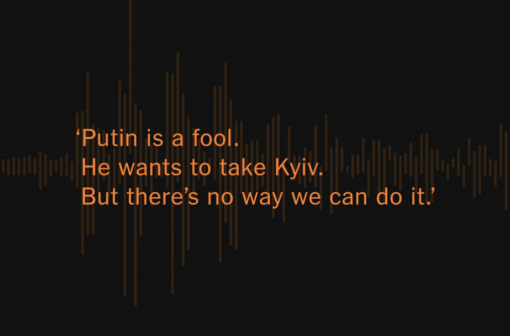As the war drags on and the brutality and terrorism of Russian aggression continue, achieving depths of depravity barely imaginable just one year ago, the news of the day — Putin’s announcement of a draft and the mixed Russian responses that greeted it (ranging from visceral protest to quiet flight to media discombobulation to further fascist frenzy), the kidnapping and subsequent release of the director of the Zaporizhzhya nuclear power plant, Ukrainian armed forces’ victories in the northeast and southeast — all seem like blips on a screen that continues to flicker its emergency signal to a world gradually, and increasingly, tuning out.
There is of course much that I could be sharing here on this blog, but most of it is easily found. The New Yorker’s David Kortava’s piece on Russian “filtration camps,” for instance, makes for suitably depressing reading. The camps, according to Human Rights Watch researcher Tanya Lokshina, are used for multiple purposes, including for “processing civilians for transfer to Russia, screening for combatants and saboteurs, gathering military intelligence, soliciting false testimonies of war crimes committed by Ukrainian soldiers, collecting personal data on the civilian population, and purging the occupied territories of residents insufficiently loyal to Moscow.”
The piece ends with its central figure, Taras, speaking of Mariupol “not as a real place in the world, under temporary occupation by the Russian Federation, but as a memory or a dream, a phantom city situated somewhere in the distant past. ‘I would really like to return there, but Mariupol doesn’t exist,’ Taras said. ‘There’s nowhere to return to.'”
The genocide continues. For those with doubts about the fascist nature of Russian mobilization, a glimpse of the “Holy War” rhetoric celebrating the “annexation” of parts of eastern and southern Ukraine — “holy war” against “madmen, perverts, and Satanists” — should suffice to remind us what the world is up against. The response is somewhat tepid, showing that many of those present are bussed-in state employees; if anything, this is fascism-from-above.
Meanwhile, the New York Times’ Visual Investigations team has produced another excellent multimedia report, this one focusing on Russian soldiers’ cell phone calls from the front, which they analyzed and authenticated over a two-month period. It can be viewed here:

The impacts of Putin’s neo-imperialist war are clearly horrific (in different measures) on both sides of the front.
If there is to be any hope for Russia, dissident Alexei Navalny argues, in a Washington Post op-ed smuggled out from his prison cell, that it rests with political transformation into a parliamentary republic. The piece is well worth reading. Here are a few quotes, in case it’s pay-walled for you:
“Control over Ukraine is the most important article of faith for all Russians with imperial views, from officials to ordinary people. In their opinion, Russia combined with a subordinate Ukraine amounts to a “reborn U.S.S.R. and empire.” Without Ukraine, in this view, Russia is just a country with no chance of world domination. Everything that Ukraine acquires is something taken away from Russia.”
“Second, the view of war not as a catastrophe but as an amazing means of solving all problems is not just a philosophy of Putin’s top brass, but a practice confirmed by life and evolution. Since the Second Chechen War, which made the little-known Putin the country’s most popular politician, through the war in Georgia, the annexation of Crimea, the war in Donbas and the war in Syria, the Russian elite over the past 23 years has learned rules that have never failed: War is not that expensive, it solves all domestic political problems, it raises public approval sky-high, it does not particularly harm the economy, and — most importantly — winners face no accountability.” [. . .]
“The war with Ukraine was started and waged, of course, by Putin, trying to solve his domestic political problems. But the real war party is the entire elite and the system of power itself, which is an endlessly self-reproducing Russian authoritarianism of the imperial kind. External aggression in any form, from diplomatic rhetoric to outright warfare, is its preferred mode of operation, and Ukraine is its preferred target. This self-generated imperial authoritarianism is the real curse of Russia and the cause of all its troubles.”
“The threat to peace and stability in Europe is aggressive imperial authoritarianism, endlessly inflicted by Russia upon itself. Postwar Russia, like post-Putin Russia, will be doomed to become belligerent and Putinist again. This is inevitable as long as the current form of the country’s development is maintained. Only a parliamentary republic can prevent this.”
The challenges of reconstructing Ukraine’s physical and cultural infrastructure will of course also be enormous. For inspiration’s sake, here is a glimpse of reconstruction in Kyïv:
Videos from the excellent “Reconstruction of Ukraine” conference, mentioned in a previous post, can be viewed here.
And see these pieces here:
- https://www.bloomberg.com/news/articles/2022-06-10/ukraine-post-war-reconstruction-may-have-green-inspiration-from-europe
- https://www.dw.com/en/ukraine-war-amid-destruction-reconstruction-booms-in-kyiv/a-63140260
TY